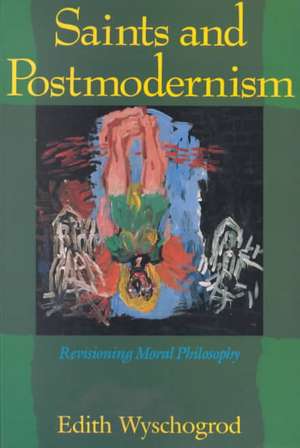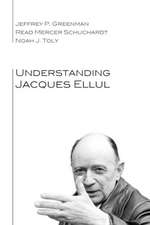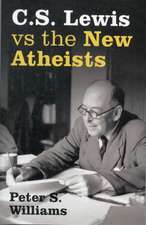Saints and Postmodernism: Revisioning Moral Philosophy: Religion and Postmodernism
Autor Edith Wyschogroden Limba Engleză Paperback – 30 sep 1990
"In this exciting and important work, Wyschogrod attempts to read contemporary ethical theory against the vast unwieldy tapestry that is postmodernism. . . . [A] provocative and timely study."—Michael Gareffa, Theological Studies
"A 'must' for readers interested in the borderlands between philosophy, hagiography, and ethics."—Mark I. Wallace, Religious Studies Review
"A 'must' for readers interested in the borderlands between philosophy, hagiography, and ethics."—Mark I. Wallace, Religious Studies Review
Din seria Religion and Postmodernism
-
 Preț: 230.29 lei
Preț: 230.29 lei -
 Preț: 115.44 lei
Preț: 115.44 lei -
 Preț: 160.17 lei
Preț: 160.17 lei -
 Preț: 215.22 lei
Preț: 215.22 lei -
 Preț: 273.06 lei
Preț: 273.06 lei -
 Preț: 327.41 lei
Preț: 327.41 lei -
 Preț: 291.10 lei
Preț: 291.10 lei -
 Preț: 265.27 lei
Preț: 265.27 lei -
 Preț: 289.96 lei
Preț: 289.96 lei -
 Preț: 286.68 lei
Preț: 286.68 lei -
 Preț: 270.14 lei
Preț: 270.14 lei -
 Preț: 231.93 lei
Preț: 231.93 lei -
 Preț: 261.66 lei
Preț: 261.66 lei -
 Preț: 224.84 lei
Preț: 224.84 lei -
 Preț: 233.25 lei
Preț: 233.25 lei -
 Preț: 237.25 lei
Preț: 237.25 lei -
 Preț: 273.42 lei
Preț: 273.42 lei -
 Preț: 292.28 lei
Preț: 292.28 lei -
 Preț: 317.33 lei
Preț: 317.33 lei -
 Preț: 273.06 lei
Preț: 273.06 lei - 21%
 Preț: 483.66 lei
Preț: 483.66 lei - 21%
 Preț: 334.54 lei
Preț: 334.54 lei - 17%
 Preț: 102.53 lei
Preț: 102.53 lei - 22%
 Preț: 482.75 lei
Preț: 482.75 lei - 15%
 Preț: 259.29 lei
Preț: 259.29 lei - 18%
 Preț: 175.92 lei
Preț: 175.92 lei
Preț: 292.08 lei
Nou
Puncte Express: 438
Preț estimativ în valută:
55.89€ • 58.51$ • 46.24£
55.89€ • 58.51$ • 46.24£
Carte tipărită la comandă
Livrare economică 05-19 aprilie
Preluare comenzi: 021 569.72.76
Specificații
ISBN-13: 9780226920436
ISBN-10: 0226920437
Pagini: 326
Ilustrații: 9 halftones
Dimensiuni: 152 x 229 x 36 mm
Greutate: 0.45 kg
Ediția:1
Editura: University of Chicago Press
Colecția University of Chicago Press
Seria Religion and Postmodernism
ISBN-10: 0226920437
Pagini: 326
Ilustrații: 9 halftones
Dimensiuni: 152 x 229 x 36 mm
Greutate: 0.45 kg
Ediția:1
Editura: University of Chicago Press
Colecția University of Chicago Press
Seria Religion and Postmodernism
Notă biografică
Edith Wyschogrod is professor of philosophy at Queens College of the City University of New York. Her most recent book is Spirit in Ashes: Hegel, Heidegger, and Man-Made Mass Death.
Cuprins
Acknowledgments
Prelude
1. Why Saints?
Narrativity
Saintly Bodies
Textuality
Historical Truth
2. Saintly Influence
Mysticism, Theism, and Saintly Life
Moral Discourse and Hagiographic Fiction
The Wings of the Dove
Word as Flesh
Ethics, Fiction, and Possibility
Beyond Possibility
3. Time without the Other
Death and the Time That Is Left
Moral Law and Radical Altruism: Rawls and Gewirth
The Time Scheme of Everyday Work
The Self as a Work: Descartes
Thinking, Animality, and the Saintly Hand
Work, Violence, and Saintly Labor
4. Diachrony and the Neuter
Neoplatonism and Time
Saints and the Renunciation of Power
Nietzsche's Objections
Dark Diachronicity
The Neuter
The Unconscious as a Language
5. The Demand for Theory
The Metaphysics of Theory: Heidegger
Freedom and Being as Possibility
The Voluptuary Structure of Desire
The Indentured Subject
Political Saints
The Logic of Exemplification
6. Language without Alterity: The Suppression of Reference and Mood
Phenomenology and Language
The Absent Other: Quine and Davidson
Reference and Mood: Davidson
Violence and the Imperative
The Philosophy of Reflection
7. Depravity, Sanctity, and Desire
The Material Forces of Production: Deleuze and Guattari
Oedipus and the Codes of Production
Nomad Thought
Three Myths of the Anit-Oedipus
Genet and the Saints of Depravity
Faces
8. Saintliness and Some Aporias of Postmodernism
The Altruism of Common Sense: Rescher
Postmodern Ecstatics and Saintliness: Kristeva
The Problem of Saintly Individuation
"Negativity Is Not Transcendence"
Notes
Index
Prelude
1. Why Saints?
Narrativity
Saintly Bodies
Textuality
Historical Truth
2. Saintly Influence
Mysticism, Theism, and Saintly Life
Moral Discourse and Hagiographic Fiction
The Wings of the Dove
Word as Flesh
Ethics, Fiction, and Possibility
Beyond Possibility
3. Time without the Other
Death and the Time That Is Left
Moral Law and Radical Altruism: Rawls and Gewirth
The Time Scheme of Everyday Work
The Self as a Work: Descartes
Thinking, Animality, and the Saintly Hand
Work, Violence, and Saintly Labor
4. Diachrony and the Neuter
Neoplatonism and Time
Saints and the Renunciation of Power
Nietzsche's Objections
Dark Diachronicity
The Neuter
The Unconscious as a Language
5. The Demand for Theory
The Metaphysics of Theory: Heidegger
Freedom and Being as Possibility
The Voluptuary Structure of Desire
The Indentured Subject
Political Saints
The Logic of Exemplification
6. Language without Alterity: The Suppression of Reference and Mood
Phenomenology and Language
The Absent Other: Quine and Davidson
Reference and Mood: Davidson
Violence and the Imperative
The Philosophy of Reflection
7. Depravity, Sanctity, and Desire
The Material Forces of Production: Deleuze and Guattari
Oedipus and the Codes of Production
Nomad Thought
Three Myths of the Anit-Oedipus
Genet and the Saints of Depravity
Faces
8. Saintliness and Some Aporias of Postmodernism
The Altruism of Common Sense: Rescher
Postmodern Ecstatics and Saintliness: Kristeva
The Problem of Saintly Individuation
"Negativity Is Not Transcendence"
Notes
Index











